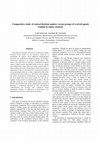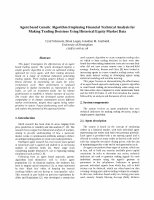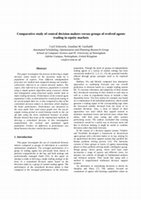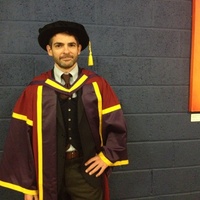Papers by Cyril Schoreels

Lecture Notes in Computer Science, 2014
While social media is increasing its extent and reach every day, research shows that its impact s... more While social media is increasing its extent and reach every day, research shows that its impact seems to be more intense in developing countries for various reasons. In developing countries, social media not only satisfies personal communication needs but also tends to compete with mainstream media for news and play a significant role in social movements. Hence potential use of this mounting medium for education needs to be explored. In this study, a social media and education survey has been prepared in order to measure perceptions, awareness and concerns of students and educators coming from different generations on the topic of social media and its use in education. Such a study is crucial to materialize different policies and strategies for enhancing education with this popular and freely available technology. Students' and faculty members' perceptions, expectations and willingness about the educational use of social media are analyzed and different generations are compared. Results of this study could shed light for developing various strategies for integration of social media into Higher Education in developing countries where the difference between generations is typically felt larger.
This dissertation involves an investigation into the correlation between human emotions and equit... more This dissertation involves an investigation into the correlation between human emotions and equity markets controlled by expectations, and their predictability using technical indicators. Furthermore, it also explores the emergence of multiple optima in the form of agent character types using a genetic algorithm, to illustrate the possibility of different genotypes performing equally well under a given set of conditions. The problem was approached by developing a system that could essentially simulate a stock market by ...
IEEE/WIC/ACM International Conference on Intelligent Agent Technology, Jan 5, 2006
This paper aims to determine whether an adaptive agent population performs better than a static p... more This paper aims to determine whether an adaptive agent population performs better than a static population. A static population is evolved on historical equity market data from the DAX-30, split into training and testing segments. An adaptive population is retrained continuously over the most recent available data that becomes available with each passing day. For comparison their performance over the out-of-sample test data is measured. Results obtained indicate a clear superiority of the adaptive over the static approach.

The role of automation in modern trading environments has increased dramatically over the last de... more The role of automation in modern trading environments has increased dramatically over the last decade, even exhibiting a fundamental shift in market behaviour as a direct consequence of algorithmic trading and a significant increase in trading frequency. As a self-propagating consequence, the need for automation in both analysis and reactivity to market movements is one of the fastest developing areas in industry and the field of computer science. A large variety of approaches exist in analysing market data and deriving indications as to the market’s future movement. The focus of this work addressed the choice of trading methodology in simulation, using popular technical analysis tools, the capital asset pricing model and a hybrid implementation of the two. The algorithmic design of the genetic algorithm used in evolving agent populations and the choice and impact of the associated fitness function was studied in depth. Furthermore, the choice of a static approach, in which agents a...

Computing in Economics and Finance, 2006
This paper investigates the process of deriving a single decision solely based on the decisions m... more This paper investigates the process of deriving a single decision solely based on the decisions made by a population of experts. Four different amalgamation processes are studied and compared among one another, collectively referred to as central decision makers. The expert, also referred to as reference, population is trained using a simple genetic algorithm using crossover, elitism and immigration using historical equity market data to make trading decisions. Performance of the trained agent population’s elite, as determined by results from testing in an out-of-sample data set, is also compared to that of the centralized decision makers to determine which displays the better performance. Performance was measured as the area under their total assets graph over the out-of-sample testing period to avoid biasing results to the cut off date using the more traditional measure of profit. Results showed that none of the implemented methods of deriving a centralized decision in this inve...
This paper investigates genetic algorithm evolved agents trading on real historical equity market... more This paper investigates genetic algorithm evolved agents trading on real historical equity market data using technical analysis, the capital asset pricing model and a hybrid model of the two approaches. Three agent groups are generated, each using solely one of the two approaches or their hybrid to determine trading decisions. Each group consists of ten independently evolved populations over a thousand generations, whose elite’s performances are consequently averaged and used to compare to the other approaches. Results indicated that the technical analysis based approach performed better than the capital asset pricing model based approach, while the hybrid approach in turn outperformed both. As part of ongoing research, the results would suggest significant benefits in performance oriented implementation of hybrid or multi-method based approaches in agent-based systems.
This paper investigates the effect of using varying amounts of training data on the specificity a... more This paper investigates the effect of using varying amounts of training data on the specificity and robustness of a multi-agent based solution for use in trading simulations using historical equity market data. Three separate amounts of training data were used in five experiments to evolve 15 groups of agents under varying conditions. These groups were then exposed to three separate test environments to determine whether differences in performance could be related back to their training environment. The results indicate that larger training data sets lead to more general solutions and overall better performance when tested in environments with varying conditions. This will lead onto future research focusing on agent behavior and decisions in financial markets.

This paper investigates the process of deriving a single decision solely based on the decisions m... more This paper investigates the process of deriving a single decision solely based on the decisions made by a population of experts. Four different amalgamation processes are studied and compared among one another, collectively referred to as central decision makers. The expert, also referred to as reference, population is trained using a simple genetic algorithm using crossover, elitism and immigration using historical equity market data to make trading decisions. Performance of the trained agent population's elite, as determined by results from testing in an out-of-sample data set, is also compared to that of the centralized decision makers to determine which displays the better performance. Performance was measured as the area under their total assets graph over the out-ofsample testing period to avoid biasing results to the cut off date using the more traditional measure of profit. Results showed that none of the implemented methods of deriving a centralized decision in this investigation outperformed the evolved and optimized agent population. Further, no difference in performance was found between the four central decision makers.
Abstract: This paper investigates genetic algorithm evolved agents trading on real historical equ... more Abstract: This paper investigates genetic algorithm evolved agents trading on real historical equity market data using technical analysis, the capital asset pricing model and a hybrid model of the two approaches. Three agent groups are generated, each using solely one of the two approaches or their hybrid to determine trading decisions. Each group consists of ten independently evolved populations over a thousand generations, whose elite's performances are consequently averaged and used to compare to the other approaches. ...

While social media is increasing its extent and reach every day, re-search shows that its impact ... more While social media is increasing its extent and reach every day, re-search shows that its impact seems to be more intense in developing countries for various reasons. In developing countries, social media not only satisfies personal communication needs but also tends to compete with mainstream media for news and play a significant role in social movements. Hence potential use of this mounting medium for education needs to be explored. In this study, a social media and education survey has been prepared in order to measure perceptions, awareness and concerns of students and educators coming from different gener-ations on the topic of social media and its use in education. Such a study is cru-cial to materialize different policies and strategies for enhancing education with this popular and freely available technology. Students’ and faculty members’ perceptions, expectations and willingness about the educational use of social media are analyzed and different generations are compared. Results of this study could shed light for developing various strategies for integration of social media into Higher Education in developing countries where the difference be-tween generations is typically felt larger.

Proc. of the IEEE/WIC/ACM International Conference on Intelligent Agent Technology, 2004
This paper investigates the effectiveness of an agent based trading system. The system developed ... more This paper investigates the effectiveness of an agent based trading system. The system developed employs a simple genetic algorithm to evolve an optimized trading approach for every agent, with their trading decisions based on a range of technical indicators generating trading signals. Their trading pattern follows a simple fitness function of maximizing net assets for every evolutionary cycle. Their performance is analyzed compared to market movements as represented by its Index, as well as investment funds run by human professionals to establish a relative measure of success. The results show that the developed system performs comparably to its human counterparts across different market environments, despite these agents being rather primitive in nature. Future forthcoming work will refine and explore the potential of this approach further.
Proc. of the UK Computational Intelligence Workshop 2004 (UKCI2004), Loughborough, UK, 62-69, 2004
This paper investigates the effect of using varying amounts of training data on the specificity a... more This paper investigates the effect of using varying amounts of training data on the specificity and robustness of a multi-agent based solution for use in trading simulations using historical equity market data. Three separate amounts of training data were used in five experiments to evolve 15 groups of agents under varying conditions. These groups were then exposed to three separate test environments to determine whether differences in performance could be related back to their training environment. The results indicate that larger training data sets lead to more general solutions and overall better performance when tested in environments with varying conditions. This will lead onto future research focusing on agent behavior and decisions in financial markets.
Proc. of the IEEE/WIC/ACM International Conference on Intelligent Agent Technology 2005, 2005
This paper aims to determine whether an adaptive agent population performs better than a static p... more This paper aims to determine whether an adaptive agent population performs better than a static population. A static population is evolved on historical equity market data from the DAX-30, split into training and testing segments. An adaptive population is retrained continuously over the most recent available data that becomes available with each passing day. For comparison their performance over the out-of-sample test data is measured. Results obtained indicate a clear superiority of the adaptive over the static approach.
IEEE 3rd International Conference on Computational Cybernetics, 2005, 2005
This paper investigates the impact of varying the quantity of data and the number of generations ... more This paper investigates the impact of varying the quantity of data and the number of generations run for every re-training step in an adaptive trading system. Using historical equity data, populations of agents are continuously retrained and assessed based on their performance across an out-of-sample data set. Comparison was performed using three test sets, for which each had one variable altered for every run. Results showed significant differences in performance when varying the number of trading days, while no difference was found when varying generations.

Proc. of the 6th International Conference on Recent Advances in Soft Computing 2006, 2006
This paper investigates genetic algorithm evolved agents trading on real historical equity market... more This paper investigates genetic algorithm evolved agents trading on real historical equity market data using technical analysis, the capital asset pricing model and a hybrid model of the two approaches. Three agent groups are generated, each using solely one of the two approaches or their hybrid to determine trading decisions. Each group consists of ten independently evolved populations over a thousand generations, whose elite’s performances are consequently averaged and used to compare to the other approaches. Results indicated that the technical analysis based approach performed better than the capital asset pricing model based approach, while the hybrid approach in turn outperformed both. As part of ongoing research, the results would suggest significant benefits in performance oriented implementation of hybrid or multi-method based approaches in agent-based systems.

Proc. of the 12th International Conference on Computing in Economics and Finance 2006, 2006
This paper investigates the process of deriving a single decision solely based on the decisions m... more This paper investigates the process of deriving a single decision solely based on the decisions made by a population of experts. Four different amalgamation processes are studied and compared among one another, collectively referred to as central decision makers. The expert, also referred to as reference, population is trained using a simple genetic algorithm using crossover, elitism and immigration using historical equity market data to make trading decisions. Performance of the trained agent population’s elite, as determined by results from testing in an out-of-sample data set, is also compared to that of the centralized decision makers to determine which displays the better performance. Performance was measured as the area under their total assets graph over the out-ofsample testing period to avoid biasing results to the cut off date using the more traditional measure of profit. Results showed that none of the implemented methods of deriving a centralized decision in this investigation outperformed the evolved and optimized agent population. Further, no difference in performance was found between the four central decision makers.

The role of automation in modern trading environments has increased dramatically over the last de... more The role of automation in modern trading environments has increased dramatically over the last decade, even exhibiting a fundamental shift in market behaviour as a direct consequence of algorithmic trading and a significant increase in trading frequency. As a self-propagating consequence, the need for automation in both analysis and reactivity to market movements is one of the fastest developing areas in industry and the �eld of computer science. A large variety of approaches exist in analysing market data and deriving indications as to the market's future movement. The focus of this work addressed the choice of trading methodology in simulation, using popular technical analysis tools, the capital asset pricing model and a hybrid implementation of the two. The algorithmic design of the genetic algorithm used in evolving agent populations and the choice and impact of the associated �tness function was studied in depth. Furthermore, the choice of a static approach, in which agents are �rst trained and then exposed to testing data, versus that of an adaptive approach, in which agents are continuously retrained, was analysed. Lastly, the impact of amalgamating trading decisions made by individual trading agents was studied, using a variety of simple voting methods compared to the performance of those agents individually. Findings clearly demonstrated that the hybrid trading methodology showed significant benefits over its constituents, while noticeable di�erences were observed in agent performance as a result of algorithm design and choice of fitness functions. Furthermore, the adaptive system showed itself clearly superior to the static. Lastly, the performance of derived amalgamated decisions proved inferior to that of the individual agents.
This dissertation involves an investigation into the correlation between human emotions and equit... more This dissertation involves an investigation into the correlation between human emotions and equity markets controlled by expectations, and their predictability using technical indicators. Furthermore, it also explores the emergence of multiple optima in the form of agent character types using a genetic algorithm, to illustrate the possibility of different genotypes performing equally well under a given set of conditions.










Uploads
Papers by Cyril Schoreels